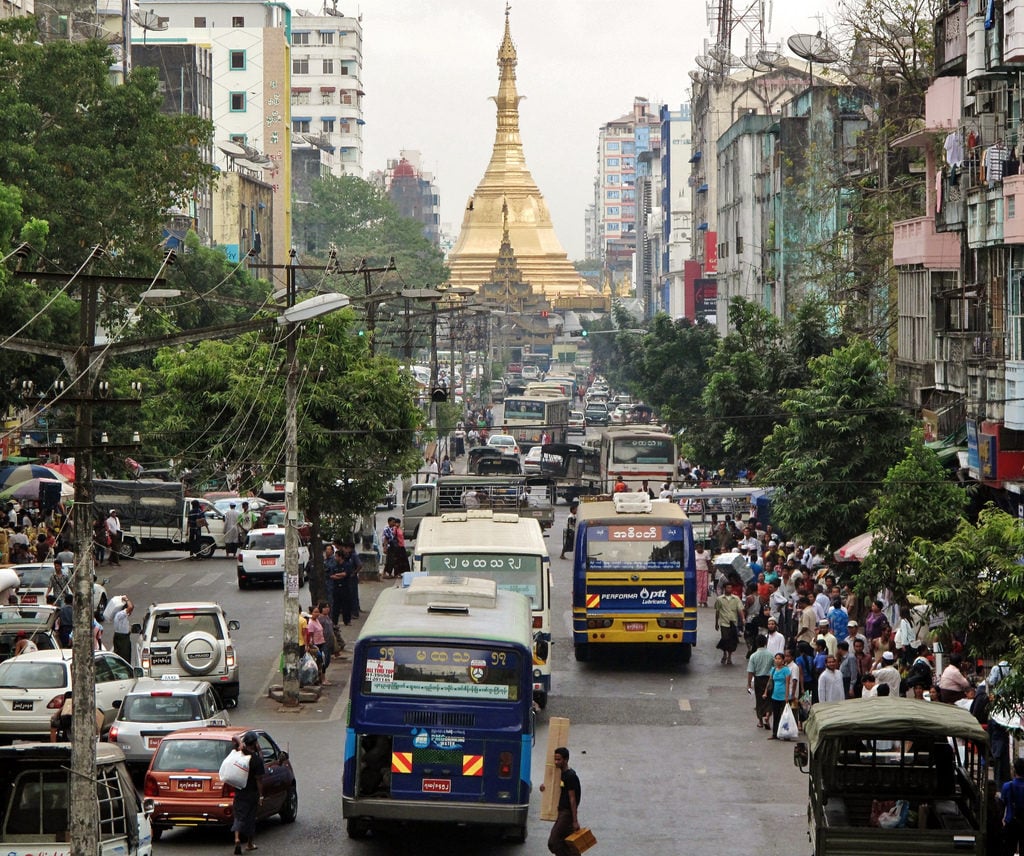
The center of Yangon. (Flickr/Francisco Anzola)
After a quick stopover in Bangkok I have arrived in Yangon, the largest city in evolving Myanmar. The sordid underbelly of Bangkok is replaced by glittering pagodas, and combative sales pitches, omnipresent in Thailand, are supplanted by polite conversation. Excitement is palpable in the city, which is currently gripped by unprecedented political developments that have engendered discernible optimism.
President Htin Kyaw of the National League for Democracy (NLD) took office in April, the first elected civilian to occupy the position since 1962. It is a time of dramatic change in Myanmar—in November 2015, the NLD swept to victory in the first openly contested polls since 1990, wrestling power from the military, or Tatmadaw. Westerners are a rare sight in Yangon, and throngs of Burmese locals react with delighted smiles and suppressed giggling as tourists roam lazily through the sultry streets, battling 100 degree heat and the occasional stench of rotting fruit.
On my first morning in Yangon I am eager to locate a teahouse, the essential Burmese institution inside which chatter and gossip is exchanged rapidly. Within thirty minutes of ambling I find myself in conversation with a portly twenty-something Burmese student. He has dark brown skin, a round face, and friendly eyes. The student is enthusiastic when I inform him of my American citizenship, and quickly peppers me with questions. “Why did you come to Yangon?” “What do you think of the people here? They are friendly, right?” After discovering my desire for a strong cup of tea, he briskly leads me into the hustling streets of Yangon and through the rustic doors of an establishment specializing in the elixir that fuels Burmese life. We sit facing one another, and he yells at a waiter who scurries through a wooden door and out of sight.
The student, informing me his name is Than and that he’s studying “shipping,” suddenly has a serious expression on his face and asks me if I am Muslim. At first I am taken aback by this question, but quickly recall there is a lot of religious and ethnic tension in Myanmar. A Muslim minority group called the Rohingya is suffering ruthless persecution in western Myanmar, but their plight has been buried by news about ISIS attacks and buffoonery in American politics.
A look of reassurance envelopes Than’s face when I inform him that I was raised Christian, and he only expresses mild concern that I no longer attend church each Sunday. Eager to steer the conversation away from religion, I ask Than about Myanmar’s future. Than is very eager for Myanmar and the U.S. to develop strong trade ties, and perceives this relationship to be essential for the future of Myanmar’s economic development. Than’s round face glistens with excitement when discussing Myanmar’s economy, exclaiming that his friends and family will soon experience a quality of life previously unseen in the country.
After downing two cups of delicious tea and experiencing a strong caffeine buzz, I decide it is time to part ways with Than. I thank him for his time, and he insists that we become Facebook friends so we can remain in contact and possibly have a beer later with his friends. He hands me his smartphone and we make the connection, and I quickly exit the tea house into the steamy city. I note that despite the U.S. easing of sanctions against Myanmar in July 2012, very few, if any, western businesses are visible in Yangon.
In the streets of Yangon, noodles are prepared breathlessly at hastily constructed street stalls, heaping piles of apples, papaya, mango, and assorted fruits are hawked by merchants, and buses packed with commuters veer carefully through traffic, avoiding taxis and pedestrians with rhythmic confidence. Face paint made from ground bark, known as Thanaka, graces many Burmese faces, and is applied in hypnotic designs on the cheek and forehead to protect the skin from a harsh sun. And books! The Burmese are avid readers, and books are stacked on every street corner—books written in Burmese, dictionaries, classic English novels—one must be careful not to step on books while prowling the streets of Yangon, for if a gaze lingers too long on decrepit British colonial architecture, a thesaurus is likely to be trampled underfoot.